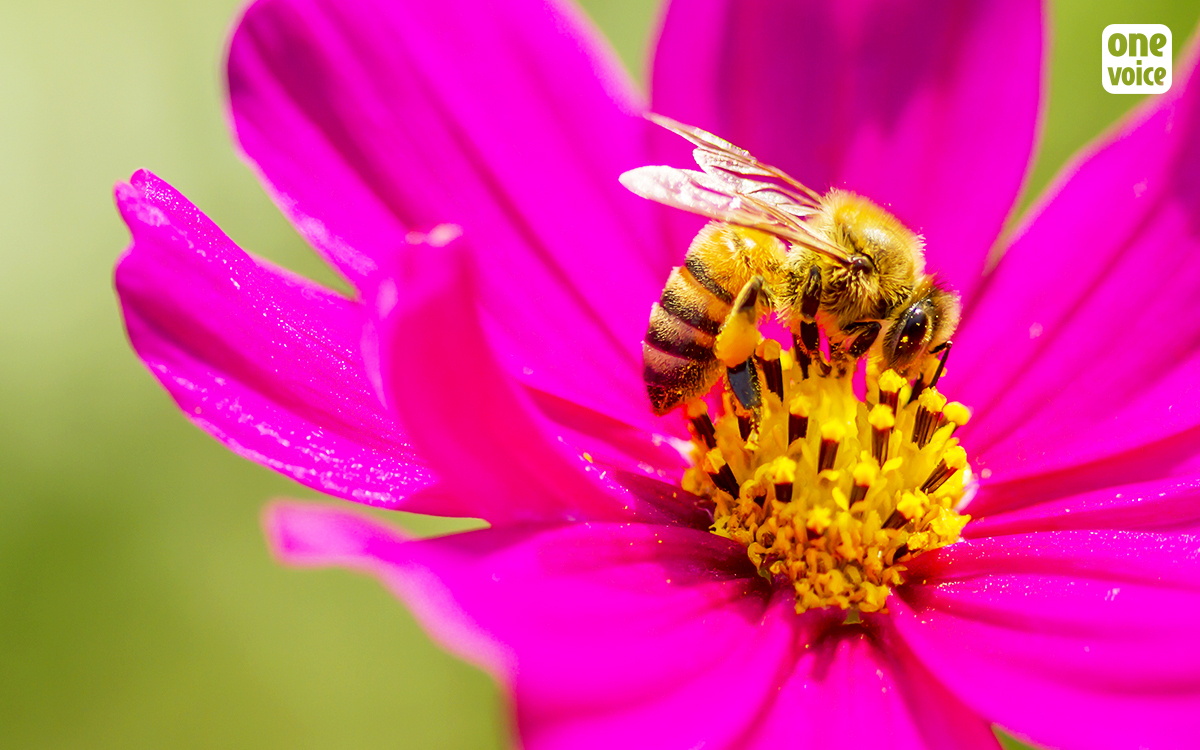
The disappearance of insects, an unprecedented disaster
One Voice leads a nonviolent fight to defend animal rights and respect all life forms. The organization operates independently and is thus free to speak and act freely.
Scientists have concluded, insect populations have collapsed. The consequences are immediate: a fall in the populations of birds, amphibians and bats. One Voice has challenged itself to create a vast network of “Arches of Nature”, private sanctuaries and gardens and natural spaces, guaranteeing the absence of pesticides and prohibiting hunting.
If
anyone doubted it, the study published in the journal Biological
Conservation on February 10th
2019 is very clear, we are no longer running from a disaster, we are
now right up to our necks in it! If from year to year we had noticed
that we have heard less and less birds singing in our countryside,
few of us may have noticed the decline, much more significant
however, the populations of insects. However, it is the disappearance
of these insects that has caused the decline in the number of birds.
Researchers
from the universities of Sydney and Queensland have synthesized a
dozen studies that have been done around the world by various
scientific organizations. Their observation is formal: the
catastrophe announced by Rachel Carson in 1962 in her work “Silent
Spring” has indeed arrived! We have destroyed billions and
billions of insects with the over use of pesticides, so much so that
we may have reached the point of no return !
The point of no return already reached?
Puerto
Rico has lost 98% of its insects! Even in German nature reserves the
insect populations have dropped by 80%. We have done no better here
in France. This is true for most species’ groups, and especially
for pollinators. The consequence of these disappearances is as
serious as it is rapid: 80% of flowering plants are pollinated by
insects. Without them, eight to nine plants out of ten would not be
here today.
On the survival of insects depends ours
The
disaster will not only be felt on the diversity of wild flora, but
also on the crops used for our consumption. Without insects, only
grasses (wheat, rice, barley, etc.) which are pollinated by the wind,
will be able to bear fruit and reproduce ! No more tomatoes, zucchini
or apricots ! Our menus will become very sad, this situation will
inevitably lead to famines around the world, and with them, their
share of human and animal migrations and of course the armed
conflicts that they will cause. This from the lack of butterflies,
bees or pollinating flies !
Birds already impacted
Already, it is our friends the
birds who have paid a very heavy price for our thirst for dominating
nature, for intensely producing agricultural products that are
increasingly toxic to humans and the environment. The passerine
populations have already dropped by more than a third and of course,
it is the species subservient to open environments, therefore to
agricultural areas, who pay the highest price for the disappearance
of insects. Some species, commonplace 30 or 40 years ago, have now
become very rare. Thus now, we hear and see rarely the buntings or
the grey shrike. The larks, which were still so numerous in our
yesterdays, have become scarce over their entire area of presence
(despite this very significant drop in their population, the larks
are nevertheless still hunted in France, using cruel traditional methods of hunting! …).
Most
passerine species, even granivores, require insects (larvae or
adults) to feed their young and to feed themselves during the
breeding season. In Europe, the loss of 80% of insects over the past
thirty years has caused the disappearance of 400 million birds !
There is an emergency, let’s act!
Birds
aren’t the only ones experiencing starvation. Bats, shrews, frogs and
lizards, also consumers of insects, are directly affected by their
disappearance.
It
is our responsibility, and even our duty to act. By our patterns of
consumption, of course, by favouring products from organic farming,
but also by direct actions for insects. Let’s open up our gardens,
meadows and fields! It’s urgent!
Join
the One Voice “Arches of Nature” network. Leave flowers and even
“weeds” to feed and breed insects away from sprayers. This
is the biggest challenge we will face. If collectively we do nothing
in practice, the government will continue to favour intensive
agriculture which has led us to this disaster.
We
are counting on you ! Download and sign the “Arches of Nature” charter and return it by post (One Voice, 7 place de la République,
CS 20263, 56007 Vannes Cedex) or by e-mail to info@one-voice.